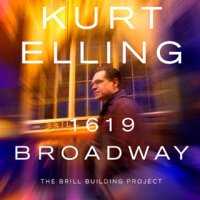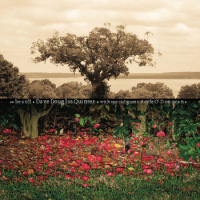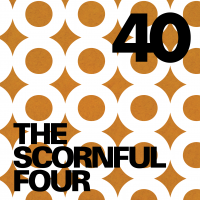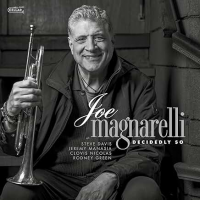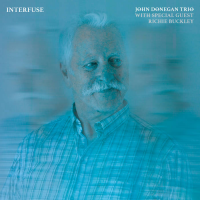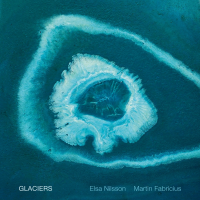Home » Jazz Articles » Album Review » Lee Konitz / Bill Frisell / Gary Peacock / Joey Baron: E...
Lee Konitz / Bill Frisell / Gary Peacock / Joey Baron: Enfants Terribles: Live at the Blue Note
The reason why standards sometimes get a bad rap these days is because, more often than not, they're approached far too literally. But here, Konitz and Frisell, in collaboration with bassist Gary Peacock and drummer Joey Baron, treat these six standards as a blank slate. Everyone knows the songs; everyone's played them countless times. But exactly how they're going to play them on a given night—in this case, over two nights in the summer of 2011, the best of which are documented on Live at the Blue Note—that's another story. Sometimes it's a case of gradual coalescence, as Konitz and Baron start "What Is This Thing Called Love" in not exactly a tenuous state, but certainly one where it's not immediately obvious what they're playing. As Konitz slowly brings in the melody (or, at least, something in the vicinity), Frisell enters in counterpoint, with Peacock and Baron gradually finding their way from freedom to form, a brightly swinging groove emerging about halfway through its six- minute duration.
That doesn't mean, however, that song form is readily established in any clear fashion. Frisell and Konitz move in and out—one soloing briefly, then the other, but it's really more collective than that. The two sometimes chase each other across the in-the-moment malleable boundaries of the song, elsewhere orbiting around each and, finally—but only after Frisell has gradually introduced some, yes, skewed voicings that finally reveal the tune—coming together for a unison theme that takes the song out without any muss, fuss or grand gestures.
And that's much how it is for the rest of this set of familiar chestnuts. No pyrotechnics, little clear delineation, and a rhythm section (poor choice of words, since Peacock and Baron are absolute equals on this ship) that, like a house of cards, is slowly constructed but ever in risk of collapsing down around its builders. That it never does its testimony to the quartet's huge collective ear, and the free-association kind of thinking that brings in the occasional quote from near and far.
Those who think that recent Frisell projects on Savoy—2011's All We Are Saying... (2011) and this year's Floratone II—suggest he's left the jazz tradition behind will be pleasantly surprised: his tone, warm and soft and with minimal effects, through his wry way of turning a phrase and his oblique approach to harmonic movement, mean that everything here sounds fresh and previously untouched.
Peacock's longest-standing gig is, in fact, another standards-based one—with drummer Jack DeJohnette in pianist Keith Jarrett's nearly three-decade old trio—but as spontaneous and fresh as that group is, it still works its magic within preconceived roadmap-style constructs that act as jumping-off points. Here, completely unencumbered, Peacock sounds better than ever, and more capable of playing in a truly free fashion—one where there can be time (or not), one where there can be changes (or not), and one where, if any semblance of form emerges (as it so often manages to do), it's more a happy accident, as much a surprise to the players as it is the audience they're playing for. Baron, of course, carries equal responsibility for the almost slap-happy way he encourages this quartet to work its way through reinvigorating familiar tunes like "Body and Soul," Stella By Starlight" and "I Remember You," all with effortless aplomb.
Konitz, born in 1927, out-seniors Peacock by nearly a decade, but as he enters the second half of his eighties, he's similarly performing better than ever, even if, as he jokes as the hour-long set closes, "I'd like to thank you on behalf of my colleagues...Uh, I forget their names right now..." Konitz may be having some "senior moments," and more power to him; but clearly not on his horn, where his imagination is clearly just as intact as his dark, full and instantly identifiable tone. Surrounded by three similarly creative and unshackled players who range, in age, from pre-WWII to early baby boomer, Konitz isn't just as unfettered and imaginative as ever; his creativity seems to have kicked into overdrive, even as his body moves in the opposite direction. Enfants Terribles: Live at the Blue Note is the close cousin and worthy successor to Live at Birdland, demonstrating that, in the music world—whether you're a musician or an oft-covered song—it's absolutely possible to prove the old (and similarly overused) saying: "you aren't getting older; you're getting better."
Track Listing
What Is This Thing Called Love?; Body & Soul; Stella By Starlight; I'll Remember April; I Remember You; I Can't Get Started.
Personnel
Lee Konitz
saxophone, altoLee Konitz: alto saxophone; Bill Frisell: guitar; Gary Peacock: bass; Joey Baron: drums.
Album information
Title: Enfants Terribles: Live at the Blue Note | Year Released: 2012 | Record Label: Half Note Records
Tags
PREVIOUS / NEXT
Support All About Jazz
 All About Jazz has been a pillar of jazz since 1995, championing it as an art form and, more importantly, supporting the musicians who make it. Our enduring commitment has made "AAJ" one of the most culturally important websites of its kind, read by hundreds of thousands of fans, musicians and industry figures every month.
All About Jazz has been a pillar of jazz since 1995, championing it as an art form and, more importantly, supporting the musicians who make it. Our enduring commitment has made "AAJ" one of the most culturally important websites of its kind, read by hundreds of thousands of fans, musicians and industry figures every month.




